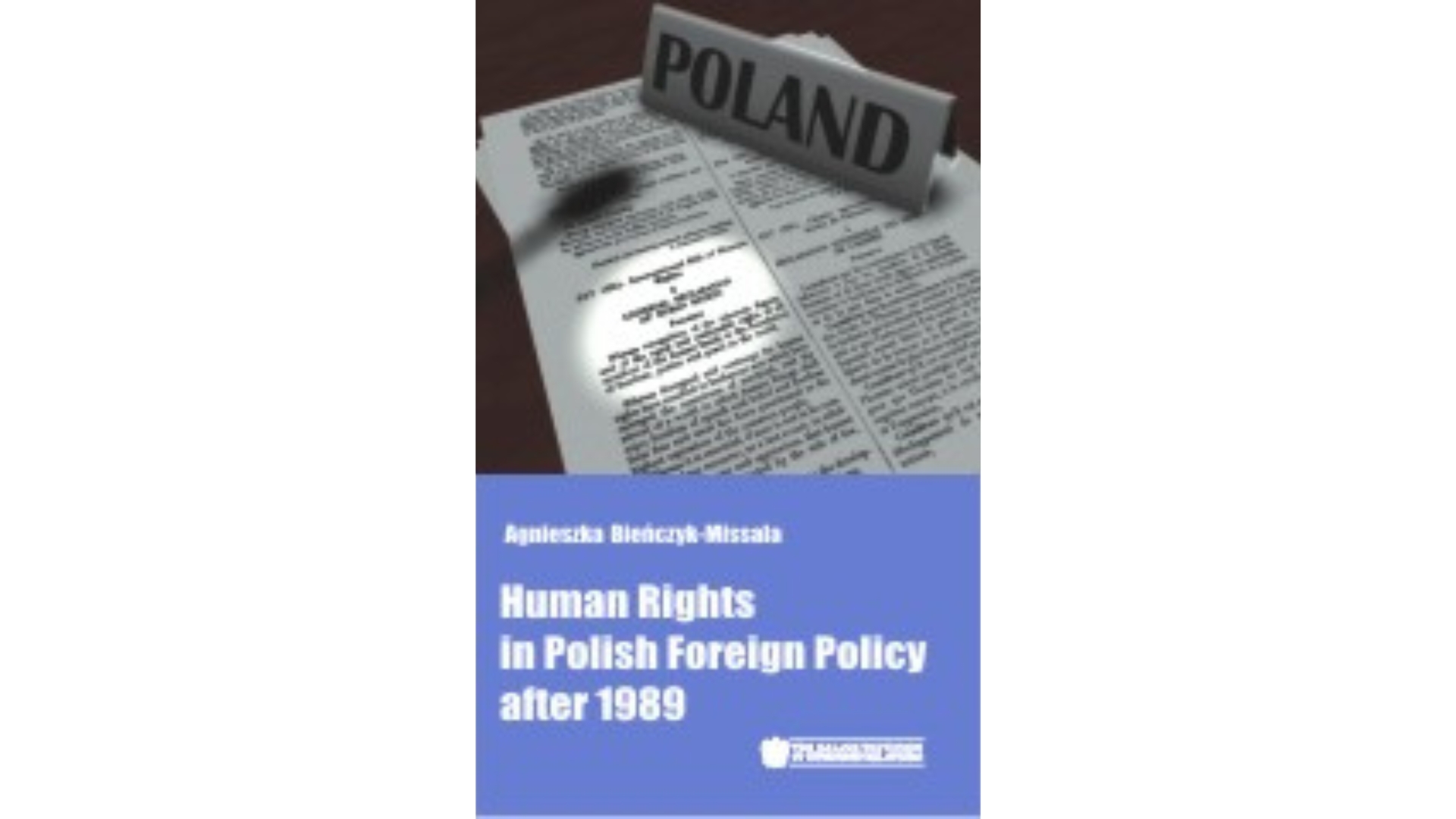Human Rights in Polish Foreign Policy after 1989

Dr. Agnieszka Bieńczyk-Missala is a lecturer at the Institute of International Relations of the Warsaw University and analyst at the Polish Institute of International Affairs. She is engaged in problems of human rights and democracy, primarily in the context of security and foreign policy, and has written articles that have appeared in Rocznik Strategiczny, Sprawy Międzynarodowe, Stosunki Międzynarodowe and Puls Świata.
Poland has no shortage of symbols that have inspired engagement for the sake of human rights. The long years of struggle ”for your freedom and ours,” the suffering of World War II, Lech Wałęsa’s “Solidarity,” Pope John Paul II... The world has appreciated our contribution to the collapse of the twin-bloc system and our services for the spread of democracy in Europe—a fulfilment of the human rights and freedoms that the Polish “Solidarity” movement advocated.
Has this romantic heritage been exploited? Did Poland succeed in building the image of a country that consistently extols human rights in the international arena? While dealing with important problems of security, the construction of independence and the creation of a free market economy, did she remember those whose fundamental rights are still being ignored?
Dealing with this important and fascinating topic, the author has drawn upon rich source materials, including government and parliamentary publications, official journals and records of meetings of the relevant international authorities, and has also interviewed people engaged in the protection of human rights.
This book, resting on a firm foundation of sources and written with boldness and skill, is the only work on the publishing market devoted to the subject of human rights in Polish foreign policy after 1989.
Spis treści:
List of abbreviations (p. 9)
Introduction (p. 11)
Chapter 1
Human Rights in Foreign Policy
1. Human Rights as a Subject of Foreign Policy (p. 19)
Human Rights—from Ideas to Practice (p. 19)
Countries in the Face of Human Rights (p. 25)
2. Foreign Policy Instruments Regarding Human Rights (p. 30)
3. The Dilemmas of Countries which Pursue a Foreign Policy Involving Human Rights (p. 36)
Human Rights and the Principle of Non-Interference (p. 36)
Human Rights vis-a-vis Cultural and Social Diversity (p. 42)
Human Rights in Foreign Policy Versus Other National Interests (p. 48)
Chapter 2
The Determinants of Polish Foreign Policy Regarding Human Rights after 1989
1. The Internal Determinants of Polish Foreign Policy Regarding Human Rights (p. 55)
Human Rights in the Policy of the Polish People’s Republic and the Concepts of Opposition Circles (p. 55)
The Principles of Poland’s Political System (p. 62)
Human Rights in the Polish Constitution (p. 65)
The Process of Formulating Polish Foreign Policy in the Field of Human Rights (p. 72)
Political Culture (p. 82)
2. The External Determinants of Polish Foreign Policy Regarding Human Rights (p. 88
Democratic Processes in Europe after 1989 (p. 88)
Poland’s Accession to the Council of Europe (p. 93)
Human Rights in the Process of Poland’s Integration with NATO and the EU (p. 97)
Poland’s International Commitments Regarding Human Rights (p. 104)
Acceptance of International Control Mechanisms (p. 124)
Chapter 3
Human Rights in Poland’s Foreign Policy towards Her Neighbours
1. Poland and the Question of Self-Determination (p. 131)
Germany’s Unification as a Fulfilment of the Right to Self-Determination. The Polish Stance (p. 133)
Poland and the Self-Determination of Lithuania (p. 139)
Poland and the Self-Determination of Ukraine (p. 148)
Poland and the Self-Determination of Belarus (p. 152)
Poland vis-ŕ-vis Chechen Aspirations of Independence (p. 155)
2. The Protection of Polish Minorities as an Element of Polish Policy towards Neighbouring Countries (p. 161)
The Problem of Minorities in Relations with Germany (p. 162)
Poland’s Policy towards the Polish Minority in Lithuania (p. 170
Poland’s Policy towards Ethnic Minorities in the Neighbouring Countries (p. 181)
3. Poland towards Violations of Human Rights and Democratic Standards in Belarus (p. 191)
4. The “Orange Revolution” (p. 201)
Chapter 4
Human Rights in Poland’s Foreign Policy within the United Nations System
1. Poland at the World Conference
on Human Rights in Vienna in 1993 (p. 209)
2. Poland’s Activity in the Commission on Human Rights (p. 214)
Poland and the Thematic Resolutions of the Commission on Human Rights (p. 215)
The Problem of Civil Defence Units (p. 215)
Resolution on the Rights of People Infected with HIV and Suffering from AIDS (p. 216)
Resolution on the Fiftieth Anniversary of the Universal Declaration of Human Rights (p. 218)
Resolution on the Role of Good Governance in the Promotion of Human Rights (p. 222)
Poland’s Position on Other Thematic Resolutions (p. 225)
Poland’s Position on Country Resolutions by the Commission on Human Rights (p. 230)
Human Rights in Cuba (p. 230)
Human Rights in China (p. 235)
Other Country Resolutions (p. 238)
3. Poland before Treaty Bodies and UN System Organisations (p. 243)
4. Poland’s Activity in the Promotion of Democracy (p. 251)
Chapter 5
Human Rights in Poland’s Foreign Policy in Regional Organisations
1. Poland’s Foreign Policy and the Human Dimension of the Conference/Organisation for Security and Cooperation in Europe (p. 259)
Poland’s Contribution to the Creation and Realisation of Human Dimension Standards in the CSCE/OSCE (p. 259)
Poland’s Chairmanship of the Organisation for Security and Cooperation in Europe (p. 265)
2. Poland in the Council of Europe Human Rights System (p. 273)
Poland’s Activity in the Council of Europe (p. 273)
Poland and the Control System of the Council of Europe (p. 278)
Conclusion (p. 285)
Notes (p. 297)
Bibliography (p. 379)
Index (p. 415)
Index of Names (p. 419)
Recenzje:
Katarzyna Sękowska, "Sprawy Międzynarodowe", nr 2/2006
